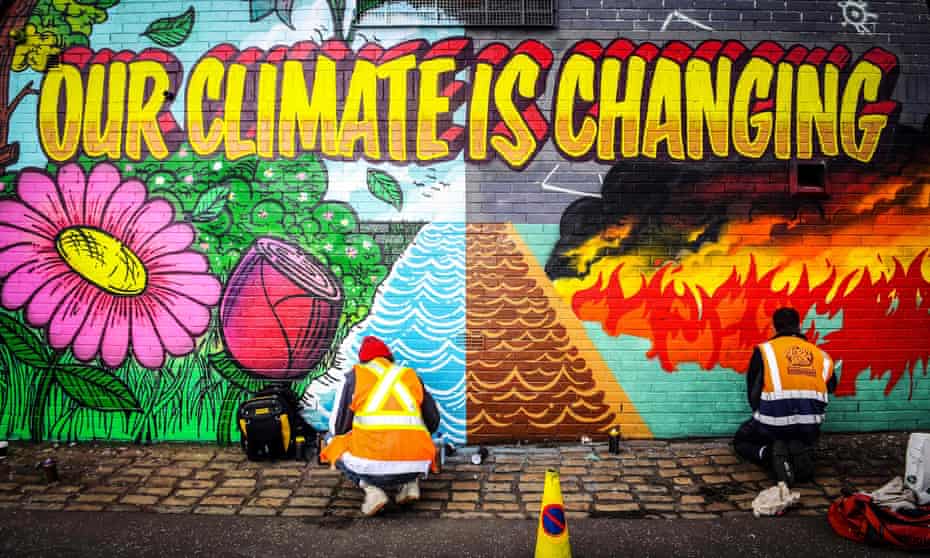Extract from The Guardian
This is no time for climate fatalism. We need science, societies and states to be in alignment for our crucial next steps.

‘The stakes have not changed – they are even more urgent today.’ Street artists paint a mural opposite the Cop26 climate summit venue in Glasgow, 13 October.
Last modified on Wed 27 Oct 2021 03.45 AEDT
In the fight against global warming, the 2015 Cop21 meeting that yielded the Paris agreement has become the landmark Cop. Glasgow Cop26 must be an accelerator of action.
As the French foreign minister at the time I chaired that conference, and I am often asked about the secret of the universal agreement we achieved there. My answer is that the success in Paris was made possible by a strong process of environmental diplomacy that required the alignment of three “planets”: science, societies and states.
Since then, the “science planet” has made progress on many fronts. Numerous studies have deepened our knowledge, showing in particular that 1.5C has become the limit we should not exceed. Technology is progressing, favouring energy savings and considerably lowering the cost of renewables when compared with carbon energy. Major innovations are happening.
The “societies planet” came up to the mark, too, and faster than we had anticipated in 2015. Non-governmental organisations, cities, regions, and universities have taken action. The public have become more aware of the challenge. Young people are showing us the path.
More and more
businesses are making commitments, for multiple reasons: ethical,
economic, financial. They do so, however, at differing paces. Among
fossil fuel producers, coal, oil and gas, the confusion between “green acting”, “green talking” and “greenwashing” still needs to be resolved.

However, the “states planet” is still lacking. The Paris agreement clearly provides in its Article 4 that each country must present a “nationally determined contribution”, updated at least every five years. Yet as I write these lines – although many countries, and the European Union have presented a national contribution in line with the agreement – some have backslid, and some have simply not submitted anything at all.
Let us hope that the Rome G20 at the end of this month and Cop26 will lead to new commitments. Donald Trump’s opposition to the treaty, international tensions, resurgent nationalism, and the intrinsic political difficulties in taking big, necessary decisions, all help to explain the shortcomings. But they do not justify them.
Clearly,
there is more work to be done. The rise in temperatures from
pre-industrial levels, which was supposed to be maintained well below 2C
and if possible at 1.5C, is currently on track to 2.7C or more. The UN
secretary general rightly called this trajectory “catastrophic”.
We already see the disastrous progression of climate breakdown in
heatwaves, mega-fires, flooding, famines, and massive forced human
migrations – which sadly often affect the most vulnerable people and
territories first. But we are all affected. Not in 10 or 30 years in the
future, but now.
It is in this context that the Glasgow Cop26 opens. In order to succeed, it must pursue at least four objectives, and it is in relation to these objectives that we will judge the results.
The first consists in adopting the Paris agreement rulebook - the shared technical guidance that will aid countries in implementing the treaty. Since Katowice Cop24 in 2018, its specifics have been mired in negotiations. It would be very disappointing if we do not adopt a text in Glasgow, or if we agree on a watered-down one.
The second goal concerns finance. Precise commitments were made in 2009, at Cop15 in Copenhagen. Rich countries promised to dedicate at least $100bn a year in 2020 to public and private climate financing initiatives in developing countries. To this day, we have not reached it. This limits the development of many countries that lack both the finance and technologies, particularly in Africa.
It’s crucial that Cop26 moves forward on this plan, while increasing the share of funding dedicated to adaptation and not only migration. This involves enhancing the share of grants, rather than loans, and addressing the question of “loss and damage” of land and resources. More generally, the whole financial and banking system must stop its support of fossil fuels and massively increase spending on green investments.
The third objective is that global climate ambitions will have to be enhanced and clarified to close the gaps between commitments and action. Not just for CO2 emissions, but also on the critical issue of methane gas – an important contributor to the climate emergency, but one which receives less attention than CO2. The reduction of methane could be the pleasant surprise of Glasgow.
In the last few months several nations have made announcements about carbon neutrality by about the middle of the 21st century: it’s notable progress.
Clear indicators and metrics are required in order to check real-time progress on these commitments, and they must be transparent. States must realise that ambitious announcements for the longer term do not remove the need for verifiable commitments on short- and medium-term goals – meaning action before 2030. It’s unclear whether the necessary goal of carbon neutrality will be reached through drastic reduction of fossil fuels or carbon capture and compensation for emissions. Only if we clarify these aspects can we determine whether the long-term paths chosen are appropriate.
Finally, the Glasgow Cop is expected to take into account, verify and amplify several important developments that have taken place since the Paris agreement. The fight against climate breakdown and the protection of biodiversity are interconnected. We must coordinate actions to tackle these two challenges with a unified approach. We also know that these questions cannot be handled efficiently if we do not undertake powerful social justice measures, such as carbon pricing methods, along with support for the activities, territories and people affected directly.
Cop26 is an occasion to make concrete the commitments of multiple sectors (cement, automobile, construction, agriculture, air transport, maritime transport and so on) to reduce their greenhouse gas emissions. Glasgow will have to show the convergence of all these actions, accompanied with detailed evaluation of the results.
Respecting these objectives is all the more indispensable in the current period, given that energy shortages and price rises are leading some large CO2 emitters to resort to increasing use of coal. This is also a major challenge for Glasgow.
Six years ago, in my opening statement at Cop21, I said: “I believe in success because all of us know that combating global warming is more than just an environmental matter. It is an essential condition to provide the whole world with food and water, to save biodiversity and protect health, to combat poverty and mass migration, to discourage war and foster peace andultimately to give sustainable development and life a chance.”
The stakes have not changed – if anything they are even higher today. We have an immense responsibility towards future generations. Climate scepticism has receded. Now, through action and results, we must also tackle climate fatalism – the belief that it is too late to do anything.
Laurent Fabius, a former prime minister of France, was chair of Cop21
No comments:
Post a Comment